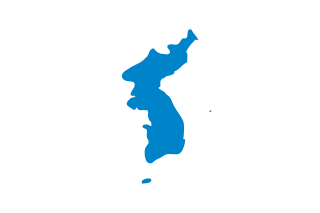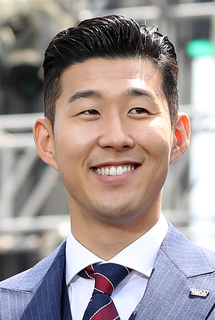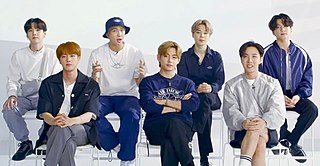
Korea is a peninsular region in East Asia. Since 1945, it has been divided between two countries at or near the 38th parallel, North Korea and South Korea. Korea consists of the Korean Peninsula, Jeju Island, and several minor islands near the peninsula. The peninsula is bordered by China to the northwest and Russia to the northeast. It is separated from Japan to the east by the Korea Strait and the Sea of Japan.

Korean is the native language for about 80 million people, mostly of Korean descent. It is the official and national language of both North Korea and South Korea, but over the past 74 years of political division, the two Koreas have developed language differences. Beyond Korea, the language is a recognised minority language in parts of China, namely Jilin Province, and specifically Yanbian and Changbai County. It is also spoken in parts of the Russian island of Sakhalin and parts of Central Asia.

The Korean War was fought between North Korea and South Korea from 1950 to 1953. The war began on 25 June 1950 when North Korea invaded South Korea following clashes along the border and rebellions in South Korea. North Korea was supported by China and the Soviet Union while South Korea was supported by the United Nations, principally the United States. The fighting ended with an armistice on 27 July 1953.

North Korea, officially the Democratic People's Republic of Korea (DPRK), is a country in East Asia. It constitutes the northern half of the Korean Peninsula and shares borders with China and Russia to the north, at the Yalu (Amnok) and Tumen rivers, and South Korea to the south at the Korean Demilitarized Zone. The country's western border is formed by the Yellow Sea, while its eastern border is defined by the Sea of Japan. North Korea, like its southern counterpart, claims to be the legitimate government of the entire peninsula and adjacent islands. Pyongyang is the capital and largest city.

South Korea, officially the Republic of Korea (ROK), is a country in East Asia, constituting the southern part of the Korean Peninsula and sharing a land border with North Korea. Its western border is formed by the Yellow Sea, while its eastern border is defined by the Sea of Japan. South Korea claims to be the sole legitimate government of the entire peninsula and adjacent islands. It has a population of 51 million, of which roughly half live in the Seoul Capital Area, the fifth largest metropolis in the world. Other major cities include Incheon, Busan, and Daegu.

Busan, officially known as Busan Metropolitan City, is South Korea's second-most populous city after Seoul, with a population of over 3.4 million inhabitants. Formerly romanized as Pusan, it is the economic, cultural and educational center of southeastern South Korea, with its port—Korea's busiest and the sixth-busiest in the world. The surrounding "Southeast Economic Zone" is South Korea's largest industrial area.

Kim Jong-il was a North Korean politician who was the second supreme leader of North Korea from 1994 to 2011. He led North Korea from the 1994 death of his father Kim Il-sung, the first Supreme Leader, until his own death in 2011, when he was succeeded by his son, Kim Jong-un.

Between 1910 and 1945, Korea was ruled as a part of the Empire of Japan. Joseon Korea had come into the Japanese sphere of influence with the Japan–Korea Treaty of 1876; a complex coalition of the Meiji government, military, and business officials began a process of integrating Korea's politics and economy with Japan. The Korean Empire, proclaimed in 1897, became a protectorate of Japan with the Japan–Korea Treaty of 1905; thereafter Japan ruled the country indirectly through the Japanese Resident-General of Korea. Japan formally annexed Korea with the Japan–Korea Treaty of 1910, without the consent of the former Korean Emperor Gojong, the regent of the Emperor Sunjong. Upon its annexation, Japan declared that Korea would henceforth be officially named Chōsen. This name was recognized internationally until the end of Japanese occupation. The territory was administered by the Governor-General of Chōsen based in Keijō (Seoul).
K-pop, short for Korean popular music, is a form of popular music originating in South Korea as part of South Korean culture. It includes styles and genres from around the world, such as pop, hip hop, R&B, experimental, rock, jazz, gospel, reggae, electronic dance, folk, country, and classical on top of its traditional Korean music roots. The term "K-pop" became popular in the 2000s. Previously, South Korean pop music was called gayo. While "K-pop" is often a general term for all popular music from South Korea, it is sometimes colloquially used in a narrower sense for either general Korean pop music or any music and artists associated with the entertainment and idol industry in the country.

Kim Jong-un is a North Korean politician who has been Supreme Leader of North Korea since 2011 and the leader of the Workers' Party of Korea (WPK) since 2012. He is a son of Kim Jong-il, who was North Korea's second supreme leader from 1994 to 2011, and Ko Yong-hui. He is a grandson of Kim Il-sung and the first leader of North Korea to have been born in the country after its founding in 1948.

Girls' Generation, also known as SNSD, is a South Korean girl group formed by SM Entertainment. The group is composed of eight members: Taeyeon, Sunny, Tiffany, Hyoyeon, Yuri, Sooyoung, Yoona, and Seohyun. Originally a nine-piece ensemble, Jessica departed from the group in September 2014. Among the prominent South Korean figures and most popular K-pop groups worldwide, Girls' Generation has earned numerous accolades and the honorific nickname "The Nation's Girl Group" in their home country.

Seoul, officially known as the Seoul Special City, is the capital and largest metropolis of South Korea. According to the 2020 census, Seoul has a population of 9.9 million people, and forms the heart of the Seoul Capital Area with the surrounding Incheon metropolis and Gyeonggi province. It is considered to be a global city and rated as an Alpha – City by Globalization and World Cities Research Network (GaWC), Seoul was the world's 4th largest metropolitan economy in 2014 after Tokyo, New York City and Los Angeles. International visitors generally reach Seoul via AREX from Incheon International Airport, notable for having been rated the best airport for nine consecutive years (2005–2013) by Airports Council International. In 2015, it was rated Asia's most livable city with the second highest quality of life globally by Arcadis, with the GDP per capita (PPP) in Seoul being around $40,000. In 2017, the cost of living in Seoul was ranked the 6th highest globally. In 2020, Seoul's real estate market was ranked 3rd in the world for the price of apartments in the downtown center. Seoul was one of the host cities for the official tournament of the 2002 FIFA World Cup, which was co-hosted by South Korea and Japan.

Kim Il-sung was a North Korean politician and the founder of North Korea, which he ruled from the country's establishment in 1948 until his death in 1994. He held the posts of Premier from 1948 to 1972 and President from 1972 to 1994. He was also the leader of the Workers' Party of Korea (WPK) from 1949 to 1994. Coming to power after the end of Japanese rule in 1945, he authorized the invasion of South Korea in 1950, triggering an intervention in defense of South Korea by the United Nations led by the United States. Following the military stalemate in the Korean War, a ceasefire was signed on 27 July 1953. He was the third longest-serving non-royal head of state/government in the 20th century, in office for more than 45 years.

Lee Ji-eun, known professionally as IU (Korean: 아이유), is a South Korean singer-songwriter, record producer and actress. The name IU is a combination of 'I' and 'you' meaning "you and I become one through music". She signed with Kakao M in 2007 as a trainee and debuted as a singer at the age of fifteen with her first mini album Lost and Found (2008). Although her follow-up albums, Growing Up and IU...IM, brought mainstream success, it was after the release of "Good Day", the lead single from her 2010 album Real, that she achieved national stardom. "Good Day" went on to spend five consecutive weeks at the top position of South Korea's Gaon Digital Chart, and in 2019, it was ranked number one on Billboard's "100 Greatest K-Pop Songs of the 2010s" list.

Son Heung-min is a South Korean professional footballer who plays as a forward for Premier League club Tottenham Hotspur and captains the South Korea national team. Considered one of the greatest Asian footballers of all time, Son was the first Asian player to score more than 50 goals in the Premier League.

Park Jae-sang, known professionally as Psy, is a South Korean singer, rapper, songwriter, and record producer. Psy is known domestically for his humorous videos and stage performances, and internationally for his hit single "Gangnam Style". The song's refrain was entered into The Yale Book of Quotations as one of the most famous quotations of 2012.

BTS, also known as the Bangtan Boys, is a South Korean boy band that was formed in 2010 and debuted in 2013 under Big Hit Entertainment. The septet—consisting of members Jin, Suga, J-Hope, RM, Jimin, V, and Jungkook—co-writes and co-produces much of their own output. Originally a hip hop group, their musical style has evolved to include a wide range of genres. Their lyrics, often focused on personal and social commentary, touch on the themes of mental health, troubles of school-age youth and coming of age, loss, the journey towards loving oneself, and individualism. Their work also often references literature and psychological concepts and includes an alternative universe storyline.

The Samsung Group is a South Korean multinational manufacturing conglomerate headquartered in Samsung Town, Seoul, South Korea. It comprises numerous affiliated businesses, most of them united under the Samsung brand, and is the largest South Korean chaebol. As of 2020, Samsung has the 8th highest global brand value.

Blackpink is a South Korean girl group formed by YG Entertainment, consisting of members Jisoo, Jennie, Rosé, and Lisa. The group debuted in August 2016 with their single album Square One, which featured "Whistle" and "Boombayah", their first number-one entries on South Korea's Gaon Digital Chart and the Billboard World Digital Song Sales chart, respectively.

Jeon Jung-kook, known mononymously as Jungkook, is a South Korean singer and songwriter. He is the youngest member and vocalist of the South Korean boy band BTS.


















